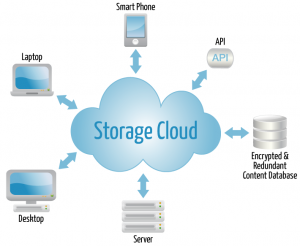It’s hard to go through a day now without hearing the word “Cloud” – it’s one of the hottest IT buzzwords of the times. But what does it really mean? In its simplest form, the term cloud describes services and products delivered over the internet. One of the most exciting cloud services today is storage. The ability to store your documents “in the cloud” to be accessed from any device at any time is quite compelling. You aren’t required to purchase expensive hardware and software solutions that need IT support for setup and maintenance. There are many cloud storage options available today, and some are free, but you need to look into the details of what “free” entails because nothing is free.
All the major cloud players of the day offer storage solutions from Amazon’s S3 and Glacier, Microsoft’s OneDrive and Google’s Google Drive. Additionally, there are many other players disrupting the current market of premise shared drives that offer compelling solutions for storing your information including:




Additionally, technology companies, like Afia, offer HIPAA compliant private or hybrid cloud storage solutions that allow you to utilize or expand your storage needs through a more private service. Hybrid cloud storage allows you to use any on-premise storage solutions that investments have already been made in and connect those to cloud storage to augment your needs.

In healthcare, the biggest concern with cloud storage is HIPAA compliance, data encryption, and control over who has access to Protected Health Information (PHI). There is no HIPAA compliance out of the box. You will have to work with a vendor to sign a Business Associates Agreement (BAA), as well as implement policies and procedures to ensure compliance and monitoring. While the risks may seem overwhelming and scary, the benefits and agility that these cloud solutions provide far outweigh the risks. HIPAA compliant cloud storage is more secure, especially in regards to a HIPAA breach scenario of storing information locally on devices versus securely stored in the cloud.
According to the 2014 HIMSS Cloud Survey, over 83% of healthcare agencies currently use or plan to use cloud services in 2015. In fact, your organization may be using cloud storage services already, and you may not realize it. This is one of the major risks we have seen at companies that have decided not to adopt cloud service strategies. Staff are using personal cloud storage solutions for managing information, and no one is aware of it or monitoring it. As a healthcare organization, you need to get in front of this particular issue by offering business solutions and strategies that are more flexible and secure so that staff can adopt this technology personally since they will work around it.
The rise of mobile is the single biggest driver to cloud storage adoption. As more clinicians and healthcare providers are required to deliver services in the community and on the go, the ability to securely and collaboratively access content on mobile devices is changing the game. This fact is important to remember since because information is easier and more convenient to access, it doesn’t mean you shouldn’t continue to follow best practices relating to security and compliance.
Make sure your organization has the following:
If you need any help implementing your cloud storage solution or are interested in Afia’s Cloud storage options, please contact me at jeremy@afiahealth.com.

As the CEO of Afia Inc., Jeremy has worked with organizations across the country to align business goals with IT strategies to help transform health care.
Phone: (734) 418-8162 | Email: jeremy@afiahealth.com
LinkedIn | Twitter